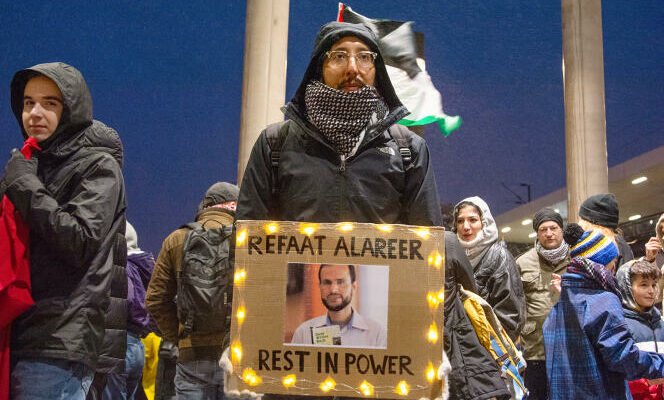His poem has been translated into dozens of languages, from Japanese to Swahili, and shared by internet users around the world. “If I must die/you must live/to tell my story (…) If I have to die/let this bring hope/let a story be born. » In Gaza ravaged by Israeli bombs, the writer Refaat Alareer shared, at the beginning of November, this poem in English on his X account, an epitaph and bulwark against the permanent shadow of death in the enclave. On December 6, late in the afternoon, he was killed in an Israeli bombardment of Gaza City. He was 44 years old. His brother, his sister and four of their children were taken with him. Their bodies are still under the rubble.
His death shook a large part of the Gazan intellectual elite, of which Refaat Alareer was one of the emblematic voices. A whole generation of English-speaking authors was formed in the English literature courses that he taught with passion for more than sixteen years at the Islamic University of Gaza. “More than a teacher, he was a mentor, a friend, and he truly cared about his students,” wrote on December 8 on X, one of his former students, the academic and writer Jehad Abusalim. The latter, who had published one of his texts in the collection Light in Gaza: Writings Born of Fire (“light in Gaza: writings born from fire”, Haymarket Books, 2022, untranslated) then added: “For Refaat, English was a tool of liberation, a way to break free from the prolonged siege in Gaza, an instrument of teleportation that challenged Israel’s barriers and the intellectual, academic and cultural blockade of Gaza. »
Poet and writer, he had published two works, including Gaza Writes Back (“Gaza responds with the pen”, untranslated, 2014), a collection of short stories written by young Gazan authors. “He was full of energy, life and humor. He loved Chicago pizza, cats, history, classical music, theater, poetry and Harry Potter “, tweeted, on December 7, the Gazan writer Muhammad Shehada, head of communications for the NGO Euro-Med Human Rights Monitor.
Brutal reactions
“He was more than an academic, he was an activist,” affirms to M The magazine of the World former American journalist Pam Bailey, who lived for several years in Gaza. In 2015, she founded the We Are Not Numbers project to publish texts by young Gazans. She is looking for someone to train them to write in English. Everyone recommends Refaat Alareer, who will carry the project with her. They became friends. “When I met him in Washington, the only place he wanted to go was the Shakespeare Library,” she remembers. She knew he was devastated by the current American support for the destruction of Gaza, where more than eighteen thousand Palestinians have lost their lives in the last two months, according to Hamas figures.
You have 50% of this article left to read. The rest is reserved for subscribers.
